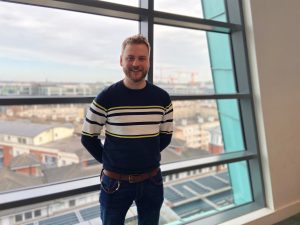The group of scientists from Trinity College Dublin created a biological sensor that detects and traps water pollutants in the same way Venus flytraps catch insects. The news was published not only in prestigious science magazines: the exciting story on the invention was released in The Times, Daily Mail and other publications. One of the members of the research team is KTU Applied Chemistry graduate Karolis Norvaiša.
The predatory plant, Venus flytrap found in the wild, catches insects by attracting them with bright colour. The flower predator has expressive blossoms that catch and lock the fly inside the blossom. The team at Trinity College Dublin has modified porphyrin molecules, which are found in the human body and in nature, to resemble the carnivorous plants: they trap small pollutant molecules that were possibly disseminated by the pharmaceutical industry and agricultural practices.
One of the members of the team behind the invention is Karolis Norvaiša, Kaunas University of Technology Applied Chemistry graduate, who got into the PhD programme at Trinity College straight after graduating from KTU. Firstly, Karolis went to one of the best universities in the globe for his Erasmus+ internship, and then he won the scholarship for PhD.

“The main motivation for coming to Dublin University Trinity College was international recognition. This institution is ranked in the top 100 universities for natural sciences”, says Karolis, now working with the team of renowned scientists on exciting projects.
After a successful internship, Professor Mathias O. Senge invited the KTU graduate to apply for a PhD programme.
“In Ireland, it is common for a doctoral student to have only a bachelor’s degree. At that time, I wasn’t sure if I wanted to pursue a PhD without a master’s degree but fate made the decision for me”, smiles Norvaiša, who has won a 4-year scholarship for pursuing PhD in chemistry in Dublin.
According to him, studying PhD at Trinity College is a daunting process and the biggest challenge is to distribute the workload to handle the deadlines. However, the exciting discoveries and recognition compensate for the hard work.
The research group at Trinity College, the oldest university in Ireland, is working with biosensors development and their role in pollution detection and elimination. The new type of biological material comprises porphyrin, the most common group of pigments found in nature.
“Porphyrins are often described as the pigments of life because they are found in the blood and haemoglobin. They can also be found in chlorophyll existing in plants,”, says Lithuanian researcher, who is working with a team led by Professor Mathias O. Senge.
According to him, in chemistry, porphyrins are known as molecular cages that can trap and lock various metals. For instance, they can respond to iron that gives haemoglobin the strength to carry oxygen in the blood. Also, magnesium that helps the plant to absorb the light efficiently during photosynthesis, converting it into chemical energy.
“Our goal was to discover a novel approach for these molecular cages”, explains Norvaiša.
The research group modified porphyrins to render them saddle-shape. According to Norvaiša, such material deformation and the junction of auxiliary coordination groups allowed to produce extremely good selective recognition system for detecting and isolation small molecules.
The work was published in “Angewandte Chemie International Edition”, one of the best international chemistry journals. The cover was illustrated by science illustrator Ella Marushchenko.
According to KTU alumni, environmental protection is not the only field to apply the modified molecules.
“In practice, these type of molecules – due to their bright colour palette – could also be used in optical sensor development. Also, our colleagues from medicine are doing experiments on how to use porphyrins. They have shown that similar molecules are used in a patient respiratory analysis to help diagnose early-stage lung cancer”, says the researcher.
Based on this discovery, the research group plans to develop and create an even more advanced molecular generation structure that helps to reduce contamination in medicine and industry. The project INITIO is funded by Horizon 2020 programme.